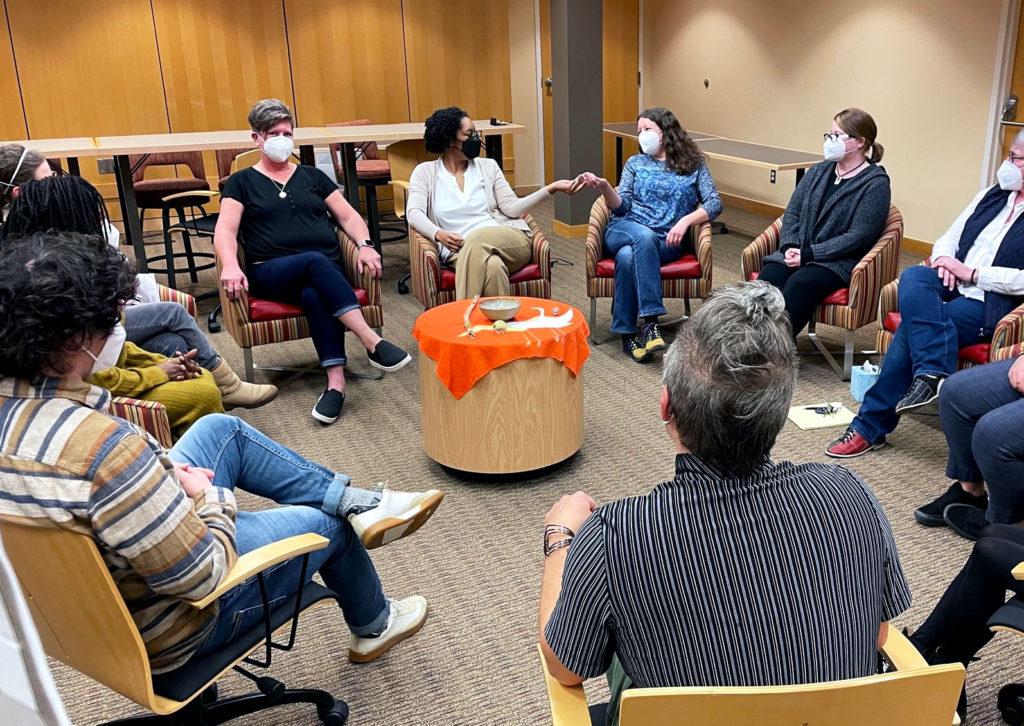By Libby Eggert
eggertli@grinnell.ed
The Restorative Practices Ambassadors Committee is aiming to change Grinnell’s campus culture. The co-chairs of the committee, Micho Adler, Sarah Smith-Benanti and Vanessa Preast, want a technique known as restorative practice circles to be the go-to pathway for conflict resolution across the College.
Under the advice of Grinnell’s Restorative Practices Coordinator Fred Van Liew, the committee is declaring April “Community Circle Month” at Grinnell. The committee hopes to host at least two circles every week and get 16 Grinnell members (including one student) certified as “circlekeepers.”
Restorative justice is a practice that started to cause more productive, long-term change in adolescents’ behaviors and reduce recidivism.
Restorative justice attempts to create another path for adolescents rather than leaving them to the criminal justice system.
Van Liew, who also works as a lawyer, said, “Restorative justice is at the opposite end of the spectrum of punishment.” Van Liew was hired through an Innovation Grant for the College.
Typically, restorative justice involves an offender and a victim having an active conversation about how the offense affected them. The goal of this conversation is to humanize both parties and prioritize healing, especially in the community.
At the College, this process of resolution could be used for a roommate conflict or even an inter-office conflict. All Community Advisors for the 2022-23 school year will undergo restorative dialogue training and will be encouraged to utilize the skills they learn with their residents.
“The whole idea is to have that conversation with someone who is trained in the dialogue process so the conflicts can be sort of avoided or worked through, and then we won’t have need for roommate changes and disruptions to students in the school year,” said Adler.
The committee wants to have facilitators, known as circlekeepers, trained across all departments, including athletics, residence life, academics or Title IX.
The committee also hosts “restorative community circles,” which cover larger topics.
Some of the circles they plan to host will focus on topics such as sustainability, diversity and inclusion, building a queer community and changing the culture at Grinnell. These larger circles are not necessarily a response to harm, but rather an open conversation for all students, faculty and staff to have a safe conversation about difficult topics.
“It is really a vital necessity that to be able to sit in a group with a bunch of people that you don’t necessarily know and tell your story in a safe personal setting,” said Adler.
The committee hosted six circles for students in November to talk about acclimating to being on campus, especially following the pandemic.
The contents of circle discussion are confidential, but Van Liew said, “you know they went well when the people hug at the end.”
They also hold circles within their own committee.
“We can practice and build community and refill our cup. It’s a safe place for us to come and be together and restore our own selves,” said Smith-Benanti.
Members of the committee said people coming to the circles for the first time can be hesitant or weary about being vulnerable, but they encourage them to take the time to show up and share as much or as little as they want.
“It takes time for people to adapt to new ways of being with each other and new ways of interacting,” said Preast.
“It’s very transformative in a way that is hard to explain unless you’ve been in a circle,” said Adler. “Trust the process, come in with a willingness to listen … I’ve been moved to tears almost every time, and I don’t cry very easily. It really is transformative.”



































































